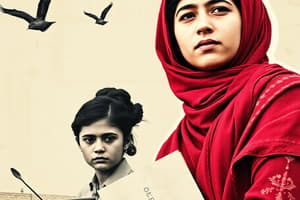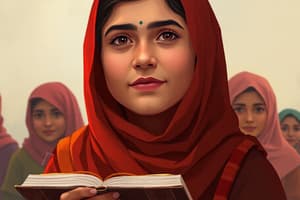Podcast
Questions and Answers
Which statement BEST encapsulates the fundamental contrast between the education offered at the madrasa and the Khushal School, as depicted in the excerpt?
Which statement BEST encapsulates the fundamental contrast between the education offered at the madrasa and the Khushal School, as depicted in the excerpt?
Malala's description of Khushal School as 'heaven' primarily serves to highlight which of the following aspects of her educational experience?
Malala's description of Khushal School as 'heaven' primarily serves to highlight which of the following aspects of her educational experience?
The phrase, 'In a country where women aren't allowed out in public without a man, we girls traveled far and wide inside the pages of our books,' exemplifies which deeper societal impact of Khushal School?
The phrase, 'In a country where women aren't allowed out in public without a man, we girls traveled far and wide inside the pages of our books,' exemplifies which deeper societal impact of Khushal School?
When the boy from the neighborhood madrasa claims Malala’s school is 'not on the straight path of Islam,' this statement most likely reflects:
When the boy from the neighborhood madrasa claims Malala’s school is 'not on the straight path of Islam,' this statement most likely reflects:
Signup and view all the answers
The anecdote of Malala losing first place to Malka-e-Noor primarily serves to highlight:
The anecdote of Malala losing first place to Malka-e-Noor primarily serves to highlight:
Signup and view all the answers
Malala's father's advice, 'It's a good thing to come in second... because you learn that if you can win, you can lose. And you should learn to be a good loser, not just a good winner,' is MOST indicative of his:
Malala's father's advice, 'It's a good thing to come in second... because you learn that if you can win, you can lose. And you should learn to be a good loser, not just a good winner,' is MOST indicative of his:
Signup and view all the answers
The statement, 'We didn't know where our education would take us. All we wanted was a chance to learn in peace,' suggests that for Malala and her classmates, education was primarily perceived as:
The statement, 'We didn't know where our education would take us. All we wanted was a chance to learn in peace,' suggests that for Malala and her classmates, education was primarily perceived as:
Signup and view all the answers
The phrase 'crazy world could carry on outside the walls of the Khushal School. Inside, we could be who we were' suggests that the school served as a:
The phrase 'crazy world could carry on outside the walls of the Khushal School. Inside, we could be who we were' suggests that the school served as a:
Signup and view all the answers
Malala's initial inability to 'make sense' of the boy’s comment about her school not being 'on the straight path of Islam' is primarily due to her:
Malala's initial inability to 'make sense' of the boy’s comment about her school not being 'on the straight path of Islam' is primarily due to her:
Signup and view all the answers
The detailed description of the activities within Khushal School – 'flew on wings of knowledge,' 'multiplication,' 'ran as free as the wind' – serves to primarily:
The detailed description of the activities within Khushal School – 'flew on wings of knowledge,' 'multiplication,' 'ran as free as the wind' – serves to primarily:
Signup and view all the answers
Flashcards
Madrasa
Madrasa
A school focused primarily on religious studies, especially the Quran.
Khushal School
Khushal School
The school where Malala felt empowered and educated.
First place trophy
First place trophy
An award given to the highest achiever at school.
Malka-e-Noor
Malka-e-Noor
Signup and view all the flashcards
TheStraight Path
TheStraight Path
Signup and view all the flashcards
Learning to lose
Learning to lose
Signup and view all the flashcards
Gender restrictions
Gender restrictions
Signup and view all the flashcards
Childhood games
Childhood games
Signup and view all the flashcards
The value of education
The value of education
Signup and view all the flashcards
Pride in academics
Pride in academics
Signup and view all the flashcards
Study Notes
Malala's Education and Experiences
- Malala's madrasa only offered Arabic study, focusing on reciting the Quran, avoiding other subjects
- Malala felt her school was superior because it fostered knowledge in a society that limited women's education
- She valued her school's freedom and the ability to learn widely compared to other schools in the area
Girl's Education in a Different Society
- In specific societies, women's education and involvement in public life are quite limited, often restricted by societal norms and traditional customs.
- Girls have to cover their heads and conceal themselves from boys
Malala's Achievements and Perspective
-
Malala won a trophy for first place in primary school, a significant achievement
-
The author was considered one of the top girls and the principal's daughter
-
Malala felt that her father did not show her preferential treatment despite her high achievements
-
Malala and Malika-e-Noor's rivalry
-
Malika-e-Noor was an intelligent and determined classmate
-
Malika-e-Noor was awarded first place in school, highlighting competition and rivalry
-
Malala felt disappointed but eventually realized the value of losing
-
Malala's father's perspective on competition and losing
-
Her father emphasized that learning from setbacks is also important, similar to the concept of "good losers"
-
Malala considered the advice but did not fully grasp it.
Studying That Suits You
Use AI to generate personalized quizzes and flashcards to suit your learning preferences.
Description
Malala's educational journey, achievements, and perspective on women's education in her society. Comparison of her school to madrasas and societal restrictions on girls' education. Focus on personal achievements and rivalries.




